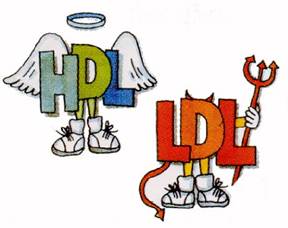First a little background on cholesterol before we get to the specifics of cottage cheese cholesterol. We hear so much about cholesterol, but why is it considered so bad for us? Well, too much cholesterol can cause a build up of plaque in the arteries. You probably remember that the arteries are responsible for bringing blood from the heart to various parts of the body. Clogged arteries caused from plaque can result in a reduction of blood flow, stroke, heart attack, and even death. While plaque is not solely made from cholesterol, it is a major contributor. There are different types of cholesterol and not all are the same.
The good type is cholesterol is known as high-density lipoprotein (HDL). It is good because it transports excessive cholesterol out of the arteries and other areas of the body, and into the liver. Low-density lipoprotein (LDL) is the bad cholesterol because it carries itself throughout the body and deposits any excessive cholesterol in the organs or tissues. This is a concern because one area where LDL cholesterol is deposited is in the artery walls in the form of plaque. Maintaining a healthy lifestyle by not smoking, staying fit, eating right (low cholesterol, sugars, and saturated fats), and keeping your stress in check can deter potential clogged arteries.
Cottage Cheese Cholesterol
The USDA recommends 300 milligrams (mg) of cholesterol per day, while people with the potential for heart disease or that have high cholesterol are advised 200 mg per day. According to the USDA Nutrient Database, cottage cheese has the following cholesterol per 1 cup:
Cottage Cheese Cholesterol (1 Cup Serving, Not Packed)
| Type of Cottage Cheese | Cholesterol (mg) |
|---|---|
| Nonfat (large or small curd) | 4 mg |
| Lowfat 1% milkfat | 9 mg |
| Lowfat 2% milkfat | 27 mg |
| Regular (4%) | 37 mg (approximately) |
You can see the large difference between the non-fat or low-fat 1% cottage cheese and the higher fat varieties. While 2% and 4% cottage cheese do not have excessive cholesterol like a Big Mac (85 mg), they are still relatively high in cholesterol. The American Heart Association recommends sticking to low-fat and low-sodium cottage cheese products to help lower high cholesterol. If extra cholesterol, calories, and fat are not a concern for you, go with the higher fat options for a better taste and to potentially avoid choosing an alternate food with worse nutritional value.


